
The Beatles
at 78 RPM
|
Cool 78 of the Month January 2009 |
|
Leon Redbone Alabama Jubilee Warner Brothers PRO-S-750 (USA) 1978 |
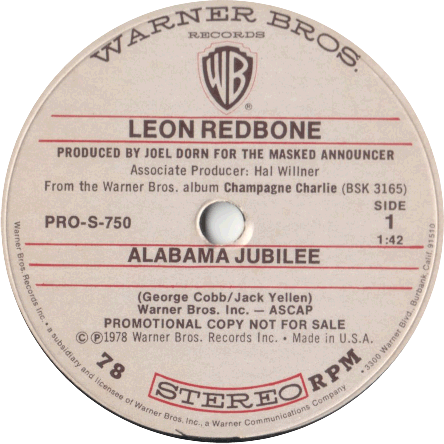
|
|
Part of the mystique of 78s is that unlike more contemporary audio media like the 45, LP or CD, it has persisted across almost the entire history of recorded sound, except for the cylinder era. 78s (or disks spinning close to that speed) have been pressed in every decade of the 20th Century. They carry stories of artists like Lucille Bogan who recorded bawdy race records in th 1930s, the first international superstars such as Scotland's Sir Harry Lauder, the sounds of the eras of war, the dawn of rock'n'roll, as well as music that topped that the top 40 radio charts. The thrill of finding out that an artist such as the Beach Boys had 78s in India, or that a 78 was pressed in 1990s is a thrill that is unique, because they are things that you didn't know existed. Just as the 78 lives on, so too does the music it carries, thanks to Leon Redbone, an artist whose is himself a bit of a mystery. His stage persona is that of a man wearing a bow tie, a panama hat and dark sunglasses. The music he makes is of a bygone era. Our artist himself is a bit of a mystery. What we do know is that he began his public career in Toronto Ontario in Canada. His performances garnered rave reviews in Rolling Stone magazine. In 1975, he was signed to Warner Brothers. In 1978, WB realised that they had an artist who was meant to be on a 78, and so they released a promo from his latest long-player Champagne Charlie. This wonderful stereo 10 inch 78 features Alabama Jubilee and Please Don't Talk About Me When I'm Gone. Warner Brothers did it up right as an acoustically superb vinyl pressing packaged in a inner sleeve and larger cardboard sleeve that duplicates the LP cover. Alabama Jubilee is a historic piece of ragtime written by George L. Cobb and Jack Yellen, first recorded in 1915 by Arthur Collins and Byron Harlan (US Columbia 1721 and Victor 17825). Both Collins and Harlan have a history of recording that goes back to 1899. The song was revived in 1951 by country singer Red Foley on US Decca 27810. This revival lead to it being rerecorded in every decade since by the likes of Jerry Reed and Jerry Lee Lewis, as well as a demo produced by Joe Meek for a group known as West Five. It was Leon Redbone's 1978 recording that manages to capture the sound and ambience of the 1915 recording though, and seeing the record spin at 78 rpm is visual perfection! The flip is a dreamy ballad written by Sam H. Stept, Sidney Clare, and Ben Palmer recorded by crooner Gene Austin in 1931. In 1928 Gene Austin recorded a hit entitled My Blue Heaven, a song that would return to the charts in a version by Fats Domino in 1956. Johnny Ray would take Please Don't Talk About Me When I'm Gone (Columbia 40090) into the charts again in 1953, rising to # 29 on Billboard. It's Leon Redbone's version, though, manages to capture that authentic feel of the 1930s. It was also in the 1950s, 1955 to be exact, that Please Don't Talk About Me When I'm Gone would treat our ears as well as our eyes. In the Warner Bother's cartoon One Froggy Evening, Michigan J. Frog, would torment a hapless construction worker set on making a fortune promoting a singing frog. Of course, as things go in cartoon land, the frog refuses to sing in front of anyone or anything but him. When Warner Brothers, as a latecomer to network TV, launched its own TV network, the WB in 1995, Michigan J. Frog would return as its spokesfrog. Warner Brothers itself has an interesting history. It started as a part of the motion picture industry in 1918, when the brothers opened their first theatre in New Castle Pennsylvania. The studio brought sound to the movies with the release of The Jazz Singer in 1929. Throughout the decades it would thrill us with movies like Casablanca and Little Caesar, and give us starts like Bette Davis and Clint Eastwood. Records on Randy Wood's Dot label by one of its stars, Tab Hunter, would cause WB to realize that it was missing out by not having a label of its own, though. The Warner Brothers record label did not launch until the end of the 1950s, and while they never got around to issuing any 78s in the USA as the 50s drew to a close, they did in Canada, South Africa, and the UK even into 1960. In the 1960s and 1970s however, the label did make up for its absence in the age of the 78 by pressing up special 78 rpm records in the USA by Randy Newman on their Reprise label and this release on Warner Brothers. In the UK, another crooner, Tiny Tim, whose style also brought back the sounds of old, would have his own 78 on Reprise in 1968. During 2009 we'll look at Warner Brothers late 78 history, a history that makes it a cool 78 rpm label! |
|
B Side Leon Redbone Please Don't Talk About Me When I'm Gone |
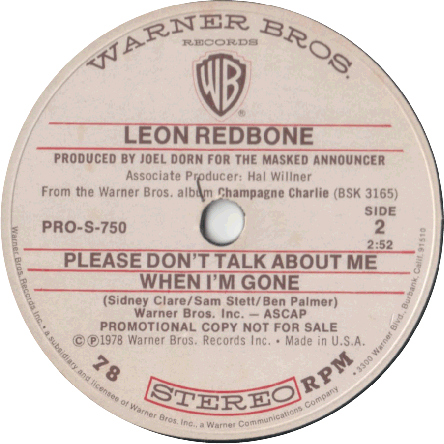
|
| Inner Sleeve |
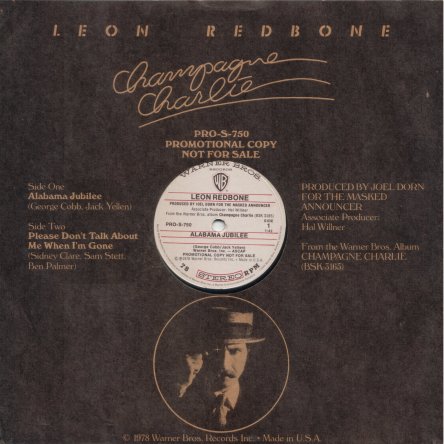
|
| Outer Sleeve |
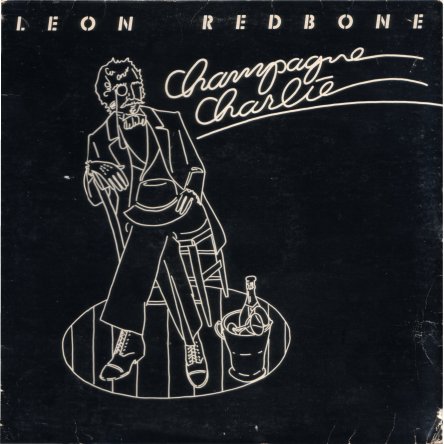
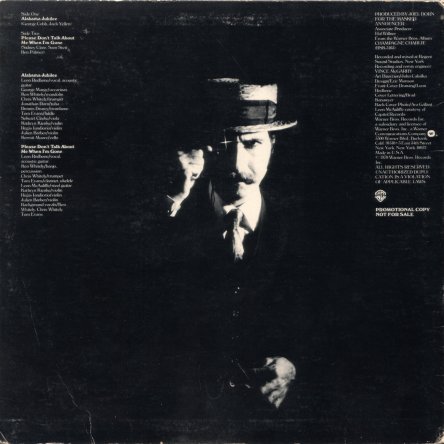
|
